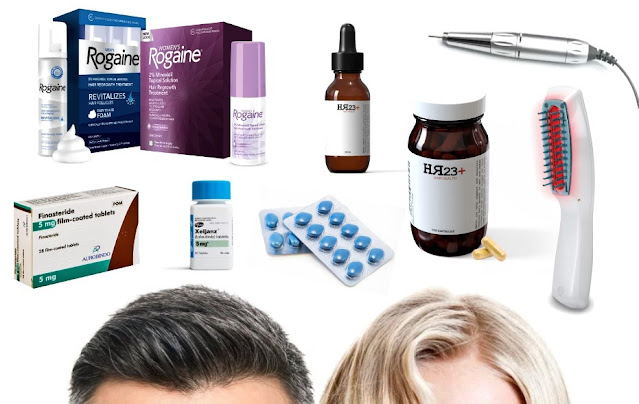Best Hair Loss Treatments: Top Solutions for Thinning Hair and Baldness in 2025
Hair loss affects millions of men and women worldwide and can significantly impact self-esteem and quality of life. Finding the best hair loss treatment depends on understanding the root cause of the problem — which may include genetics, hormonal changes, medical conditions, medications, or lifestyle factors.
Once you identify what’s causing your hair loss, you can choose the most effective treatment tailored to your specific situation. Below, we explore the most proven and widely used hair loss treatments available today — from medical options and natural therapies to cutting-edge innovations.
1. Minoxidil (Rogaine): The Widely Used OTC Treatment
Minoxidil is one of the most popular over-the-counter hair loss treatments for both men and women. It is applied topically to the scalp as a foam or liquid and works by stimulating blood flow to the hair follicles, prolonging the growth phase of the hair cycle.
-
✅ Best for: Androgenetic alopecia (male and female pattern baldness)
-
🕐 Results: Typically visible within 3 to 6 months of consistent use
-
⚠️ Note: Results last only with continued use. Hair loss may resume if treatment is discontinued.
2. Finasteride (Propecia): A DHT-Blocking Prescription Pill
Finasteride is an oral, prescription-only treatment for male pattern baldness. It works by inhibiting 5-alpha-reductase, the enzyme responsible for converting testosterone into dihydrotestosterone (DHT) — the hormone most closely linked to hair follicle shrinkage and pattern hair loss.
-
✅ Best for: Men with androgenetic alopecia
-
📉 Effectiveness: Reduces hair loss and promotes regrowth in up to 90% of male users
-
⚠️ Warning: Not suitable for women — especially during pregnancy — due to risk of birth defects. Potential side effects include reduced libido and erectile dysfunction.
3. Hair Transplant Surgery: Permanent and Natural-Looking Results
Hair transplantation is a surgical procedure in which healthy hair follicles are taken from a donor area (usually the back or sides of the scalp) and implanted into thinning or bald areas. The two most common techniques are FUT (Follicular Unit Transplantation) and FUE (Follicular Unit Extraction).
-
✅ Best for: Moderate to advanced hair loss
-
💡 Benefits: Permanent, natural-looking results
-
⚠️ Considerations: High cost, invasive procedure, and recovery time required
4. Low-Level Laser Therapy (LLLT): Non-Invasive Follicle Stimulation
Low-Level Laser Therapy (LLLT) uses red light or laser diodes to stimulate dormant hair follicles and encourage growth. Devices such as laser combs, helmets, and caps can be used at home several times per week.
-
✅ Best for: Early to moderate hair thinning
-
🧠 How it works: Improves blood circulation, boosts follicle energy, and promotes the anagen (growth) phase
-
⚠️ Considerations: Results vary, and regular use is required over several months.
5. Platelet-Rich Plasma (PRP) Therapy: Natural Regrowth Using Your Own Blood
PRP therapy is a regenerative treatment that involves drawing a small amount of your blood, processing it to concentrate the platelets, and injecting it into the scalp. These growth factors stimulate follicles and encourage new hair growth.
-
✅ Best for: Early to mid-stage hair thinning
-
📈 Results: Noticeable improvement often seen after 3–4 sessions
-
⚠️ Considerations: Expensive and must be repeated periodically to maintain results.
6. Topical and Prescription Medications: Targeted Treatment Options
In addition to finasteride and minoxidil, dermatologists may recommend other prescription medications or topical treatments depending on the cause of your hair loss:
-
Anti-androgen drugs (for women with hormonal hair loss)
-
Topical corticosteroids (for autoimmune conditions like alopecia areata)
-
Medications for underlying medical conditions that contribute to shedding
⚠️ Important: These medications can cause side effects and should only be used under medical supervision.
7. Keratinocyte Growth Factor (KGF): Emerging Growth-Stimulating Therapy
Keratinocyte Growth Factor (KGF) — also known as fibroblast growth factor 7 (FGF-7) — is a naturally occurring protein involved in tissue development, including skin and hair follicles. Applied topically, KGF serums aim to enhance follicle activity and promote new hair growth.
-
✅ Best for: Early-stage thinning and scalp rejuvenation
-
💡 How it works: Supports follicle health, boosts regeneration, and enhances growth conditions
8. Hair Growth Supplements: Natural Support from Within
For those seeking a non-prescription, side-effect-free option, hair supplements can play a powerful supportive role. Leading formulations like HR23+® combine DHT-blocking botanicals, essential vitamins (like biotin and B6), and minerals (like zinc and silica) to help reduce shedding and improve growth naturally.
-
✅ Best for: Early-stage hair thinning and prevention
-
📊 Effectiveness: 9 out of 10 users report visible improvements within 3 to 12 weeks
-
🧴 Advantages: Safe, easy to use, and effective for both men and women
Choosing the Right Hair Loss Treatment for You
The best hair loss treatment depends on your individual condition, stage of hair loss, and overall health. In many cases, combining treatments — such as using minoxidil with HR23+®, or PRP alongside LLLT — can deliver more noticeable results.
Before starting any treatment, it’s essential to consult a dermatologist or hair loss specialist. They can diagnose the underlying cause, guide you on the most effective solutions, and help monitor your progress.
Final Thoughts
Hair loss is a complex condition, but thanks to advancements in science and technology, there are now more solutions than ever. Whether you choose medications like minoxidil or finasteride, advanced therapies like PRP or laser treatments, or a natural supplement like HR23+®, the key is early intervention, consistency, and patience.



Comments
Post a Comment